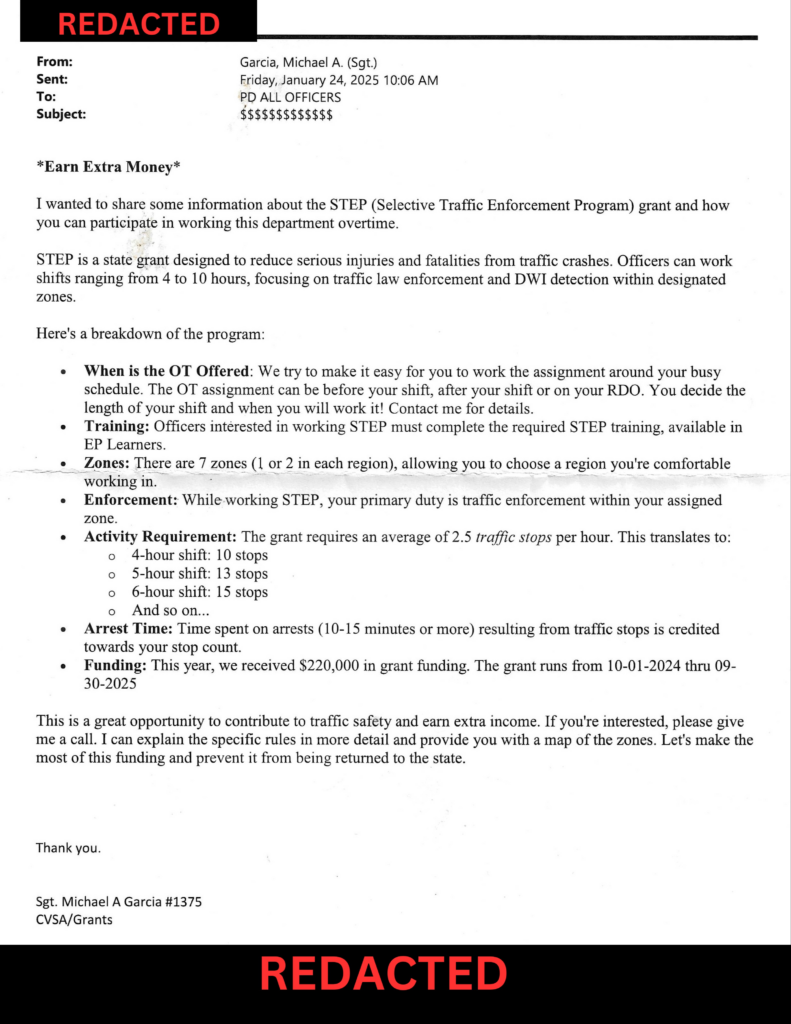25 January 2025, El Paso, Texas, Steven Zimmerman – Like many departments that accept the STEP grant from the National Highway Traffic Safety Administration, the El Paso Police Department is skirting the law by incentivizing officers to make more traffic stops than usual. Could accepting this grant be part of a plan that El Paso Police Chief Peter Pacillas calls “Project 25?”
25 January 2024, El Paso, Texas, Steven Zimmerman—We’ve heard from police departments nationwide that there are no quotas on the citations police officers write; for most departments, that is true unless you are talking about the El Paso Police Department.
On 24 January 2025, at 1006 hrs, Sgt. Michael A. Garcia of the El Paso Police Department sent out the following email:

Sgt. Garcia ensured the email would catch the officers’ attention by selecting thirteen dollar signs as the subject line. With the first line of the email, “Earn Extra Money,” he doubled down on grabbing their attention.
In the email, Sgt. Garcia talks about the STEP (Selective Traffic Enforcement Program) grant and how officers can participate in this program to earn extra money.
The STEP grant is a funding source provided by the National Highway Traffic Safety Administration (NHTSA) to state and local law enforcement agencies. It allows them to implement targeted traffic enforcement campaigns focused on specific high-risk traffic violations like speeding, impaired driving, and not wearing seatbelts, often combined with public education and outreach efforts to improve road safety.
Sgt. Garcia wrote in his email, “Officers can work shifts ranging from 4 to 10 hours, focusing on traffic law enforcement and DWI detection…” This program incentivizes officers to look for drivers violating traffic laws, contact them, and write citations.
Key points about STEP grants:
- Focus on specific traffic violations: Law enforcement agencies use STEP funds to conduct concentrated enforcement activities on particular traffic safety concerns identified in their area, like speeding in specific zones or impaired driving during holidays.
- Data-driven approach: To maximize effectiveness, STEP programs typically rely on crash data analysis to identify high-risk areas and behaviors to target with enforcement efforts.
- Public awareness component: Besides enforcement, STEP often includes public education campaigns to inform drivers about targeted traffic violations and increased enforcement activities.
- Enforcement strategies: Common enforcement strategies used in STEP programs include saturation patrols, checkpoints, and targeted traffic stops.
The NHTSA is providing this grant to set quotas for departments all across the nation.
According to an email provided to us by an officer from the Westside Regional Command and the Lower Valley Regional Command, the El Paso Police Department has laid out specific rules for officers to participate in the STEP program.
The overtime offered for the STEP grant can be before or after an officer’s regular shift. Officers interested in participating in STEP must complete training. Officers can select the zone they feel “comfortable working in.”
While the email does not specify how much an officer can earn, it does specify how many stops an officer must make during their overtime shift.
4-hour shift: 10 stops
5-hour shift: 13 stops
6-hour shift: 15 stops
“This is a great opportunity to contribute to traffic safety and earn extra income,” Sgt Michael Garcia wrote in the email distributed to police officers citywide. While some may say this is a way to put more officers on the street, work overtime, and help reduce traffic violations, it’s not strictly legal.
While some police departments may set “productivity goals,” they deny specific quotas. In many places, such as North Carolina, California, Texas, and Florida, traffic ticket quotas are expressly prohibited by law or illegal.
One could argue that while the STEP grant requires a certain number of traffic stops per hour (2.5 per hour, according to Garcia’s email), it does not set a quota. However, the email dictates the number of stops an officer must make.
It is generally not considered legal to directly incentivize police officers with bonuses or quotas based on the number of traffic stops they conduct, as this can lead to excessive and discriminatory policing practices. Most jurisdictions explicitly prohibit such practices; the primary goal of policing should be public safety, not revenue generation through tickets.
The NHTSA website does indicate that the “Selective Traffic Enforcement Program (STEP) is not designed to set quotas for officers to make traffic stops; its primary focus is on intensifying enforcement of specific traffic laws in targeted areas to improve road safety, not on achieving a specific number of stops per officer, which is considered a ‘quota’ and is generally prohibited by law in most jurisdictions.”
The NHTSA says the goal is to change driving behavior by raising awareness and actively enforcing the targeted laws, not to generate a certain number of citations per officer. Is that the case in El Paso, though?
“We are expected to issue citations,” said the Westside Regional Command Center officer, who provided us information about the email. “We get the overtime funded by the grant, the City of El Paso gets money from the citations we are expected to write.”
While the officer said they may issue written warnings, they are discouraged from doing so.
“We don’t have enough officers to be out running overtime like this,” said the Westside officer. “It’s going to make some officers more exhausted than they normally would be. We need to do better at recruiting before we do things like this STEP program.”
Another drawback to programs such as the one presented by the STEP grant is officers having to appear in court.
“If we have to write tickets, and the driver wants to fight it, we have to take time off the streets to go to court,” said the Westside Regional Command Center officer. “Again, we don’t have enough officers for this.”
Check with your City and State to see if officers in your area participate in the STEP grant program. If so, it may be time to demand a change in how grants such as this work.